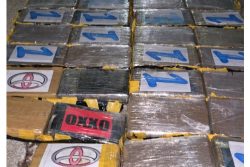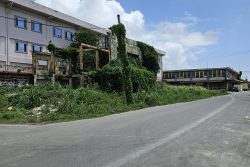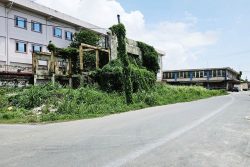The Co-operative Republic of Guyana and the Republic of Trinidad and Tobago (hereinafter referred to individually as “the Party” and collectively as “the Parties”);
CONSIDERING the commitment of both governments to continue the development of cooperation mechanisms to foster the creation of an environment conducive to energy integration on the basis of the principles of reciprocity, solidarity and respect for sovereignty;
RECOGNIZING that the development of the energy sector contributes significantly to the strengthening of economic and social development while improving the quality of life of the citizens of both Parties;
The Parties have reached the following understanding:
Article 1 Objective
This Memorandum of Understanding on Energy Cooperation (hereinafter referred to as MOU) establishes the process through which the Parties agree to work with each other in the development of the energy and energy related sectors of the Parties with the aim of developing and promoting joint projects throughout the hydrocarbon value chain in accordance with the provisions hereof and without prejudice to their respective national legal systems.
Article 2 Areas of Cooperation
1. The Parties may cooperate in the following areas:
(a) technical assistance in the areas of exploration and production of hydrocarbon resources;
(b) the exchange of information on public policies in the area of the regulation, administration and sovereign management of hydrocarbon resources and technology transfer;
(c) the exchange of information on government programmes throughout the hydrocarbon value chain and related experiences;
(d) the promotion of training and capacity building of technical personnel and the development of energy technologies through, inter alia, technical visits, secondments, seminars and presentations;
(e) the promotion of cooperation and exchange of experiences between state-owned petroleum enterprises for the development of joint projects utilising mechanisms convenient to the Parties;
(f) the development of policies, plans and protocols relating to health, safety and the environment and the establishment of procedures to prevent and respond to operational accidents which may result in damage, environmental impacts and personal injury;
(g) the development of policies relating to local content;
(h) the identification and development of projects throughout the hydrocarbon value chain;
(i) the identification of projects in the area of construction and maintenance of plants and infrastructure related to transportation, storage and supply of hydrocarbons and derivatives;
(j) the exploration of possibilities for synergy through exchange arrangements and other delivery mechanisms for hydrocarbons and derivatives; and
(k) any other means of cooperation agreed to by the Parties in the areas related to the objective of this agreement in accordance with the national legal system of each country.
2. The Parties may enter into specific agreements for the development and implementation of the activities described above.
Article 3 The Executing Committee
1. The Parties will designate the Ministers responsible for energy and energy related industries who shall comprise the Executing Committee for the implementation this MOU.
2. The Executing Committee will establish a Joint Working Group comprising a maximum of ten (10) representatives, of which each of the Parties will designate five (5) members respectively.
3. The Executing Committee will develop the guidelines and the policies of the Joint Working Group.
4. The Parties will provide written notice of its representatives of the Joint Working Group to the other Party within thirty (30) days from the entry into force of this MOU.
Article 4 Joint Working Group
1. The Joint Working Group will identify and evaluate the feasibility of the projects and activities in pursuance of the objective of this MOU, and will advise on potential areas of cooperation between Guyana and Trinidad and Tobago in accordance with guidelines set by the Executing Committee.
2. In the performance of its functions under this MOU, the Joint Working Group will:
(a) establish Joint Technical Teams comprising of representatives from the Parties and such other persons as either Party may appoint;
(b) establish the Terms of Reference of the Joint Technical Teams to advance the achievement of cooperation activities in accordance with the objective of MOU;
(c) determine the priority and specific content of the activities to be undertaken in fulfilment of the objective of this MOU;
(d) require the Joint Technical Teams to report to Joint Working Group within three (3) months of their creation, unless otherwise agreed;
(e) receive, consider and make recommendations in writing with supporting documentation to the Executing Committee on the matters referred for its determination and advice pursuant to Article 2 of this MOU;
(f) invite other persons to attend meetings at the request of either Party, as required;
(g) and report to the Executing Committee established herein within sixty (60) days of the receipt of a written report from Joint Technical Teams.
The Joint Working Group may request the services of experts from the hydrocarbon industries of the Co-operative Republic of Guyana and the Republic of Trinidad and Tobago to advise on matters to be addressed in the process of implementation of this MOU.
Article 5 Expenses
1. Each Party will bear its own internal expenses related to any activity carried out under this MOU in accordance with its respective budgetary allocations.
2. The Executing Committee will mutually agree in advance to the contracting of third parties and the distribution of costs related to any activity undertaken under this MOU.
Article 6 Labour Relations
All personnel or representatives designated by a Party to participate in cooperation activities under this MOU shall be deemed to be under the direction and supervision of such Party and shall continue to be governed by and subject to the terms and conditions of employment of that Party. There shall not be any implied labour or contractual relationship between the personnel or representatives of a Party and the other Party or between personnel and representatives of the Parties.
Article 7 Confidentiality
1. Each Party accepts that all information provided directly or indirectly by the other Party shall be treated as confidential information and shall be held and protected in strict confidence, except as required by law and shall not be further disclosed by the receiving Party without prior consent of the disclosing Party.
2. The term “confidential information” does not include information that is or comes within the public domain other than through the fault of either Party.
3. The confidential information disclosed by one Party shall remain the property of that Party, who may request the return thereof at any time. Upon receipt of such request, the other Party will promptly return to the disclosing party all original confidential information disclosed hereunder and shall ensure that all copies and reproductions thereof in its possession are destroyed.
4. The obligations contained in this Article will survive for a period of ten (10) years after the termination of this MOU, unless otherwise agreed by the Parties.
Article 8 Non-Exclusivity
This MOU does not provide any exclusivity or prohibit either Party from entering into agreements or instruments of this type with third parties.
Article 9 Existing Arrangements
Unless the Parties agree otherwise, this MOU will not affect existing arrangements of either Party or existing discussions between the Parties as at the date of entry into force of this MOU.
Article 10 Dispute Resolution
Any dispute between the Parties arising from the interpretation, application, implementation, or compliance with this MOU will be resolved through negotiations by the Joint Working Group in the first instance or by the Executing Committee. Where the dispute has not been resolved within the ninety (90) working days, the dispute shall be resolved amicably between the Parties through diplomatic means.
Article 11
Sovereignty
Nothing provided in this MOU will affect the rights of the Parties over their respective archipelagic waters, territories, maritime zones and air space under their sovereignty and jurisdiction and all natural resources in respect thereof, in accordance with the national laws and regulations of the respective Party and the applicable rules and principles of international law.
Article 12
Amendment
This MOU may be amended by written agreement between the Parties through diplomatic channels.
Article 13
Non-Binding Nature
The Parties acknowledge that this MOU shall not constitute a legally binding agreement between the Parties in any respect, nor is it intended to create rights or provide remedies enforceable by either Party
Article 14
Entry into Force and Duration
1. This MOU will be applicable upon the signature of both Signatories and shall remain in effect for a term of five (5) years, and will automatically be renewed for other periods of five years each, unless both Signatories mutually agree otherwise, or either of them terminates it as hereunder.
2. Either Party may notify the other Party at any time through diplomatic channels of its intention to terminate this MOU. Termination shall be effective six (6) months after the date of the receipt of the notification.
3. The termination of this MOU shall not affect the development of programmes and projects agreed to by the Parties as at the date of termination, the implementation of which shall continue unless otherwise agreed by the Parties.
Signed in the city of Georgetown on the 19th day of September, 2018 in duplicate.
FOR THE GOVERNMENT OF CO-OPERATIVE REPUBLIC OF GUYANA
FOR THE GOVERNMENT OF THE
REPUBLIC OF TRINIDAD AND
TOBAGO








